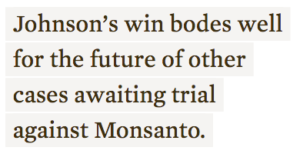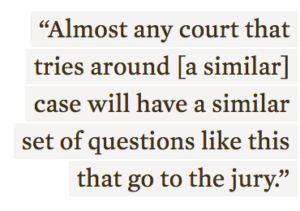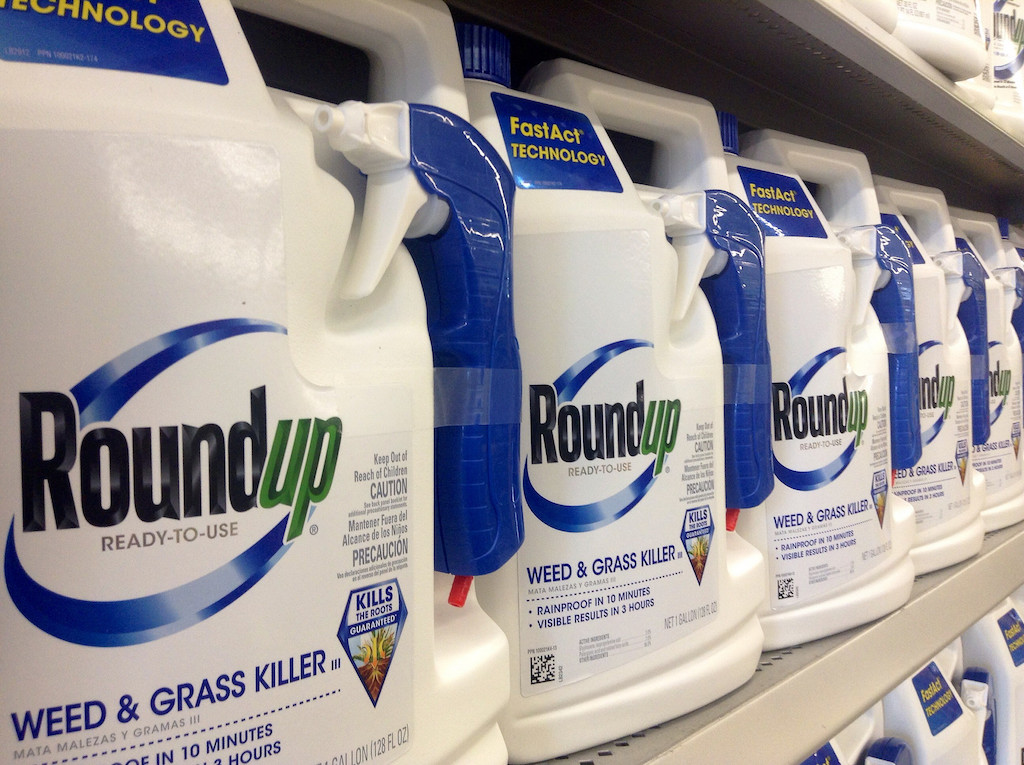New Food Economy: Why were damages in Monsanto’s Roundup trial so high? Not only is the giant liable, but it caused harm deliberately
by Jessica Fu | August 13th, 2018
What the $289-million verdict in favor of a former groundskeeper suffering from terminal cancer means for hundreds of other, similar lawsuits awaiting trial.
A California Superior Court jury on Friday found agrochemical company Monsanto liable for making a product that contributed to former school groundskeeper Dewayne “Lee” Johnson’s terminal cancer, and awarded him $289 million in damages. It’s a verdict that could propel hundreds of similar lawsuits against the company going forward.
Beginning in 2012, Johnson, now 46, worked as a groundskeeper for the Benicia Unified School District in a suburb north of San Francisco. During his employment, he routinely applied Monsanto’s flagship herbicide Roundup, a product made with the highly controversial ingredient glyphosate, to control weeds on school property. According to CNN, Johnson suffered two incidents during his tenure that accidentally soaked him in the product. In 2014, he was diagnosed with non-Hodgkin lymphoma, a type of cancer that affects the immune system.
In early July of this year, a federal judge cleared for trial the hundreds of existing cases that have been brought against Monsanto in recent years by cancer survivors, family members, and estates, saying there was enough evidence related to glyphosate for a jury to hear them. Johnson’s was the first such case to go to trial. In cases like his, California law permits dying plaintiffs to be granted expedited trials.
 The jury took three days to reach its verdict. In its decision, it found that Monsanto failed to warn Johnston of Roundup’s potential risks, and that “the lack of sufficient warnings” was a “substantial factor in causing harm to Mr. Johnson.” In a statement, Monsanto vice president Scott Partridge said the company will appeal the decision:
The jury took three days to reach its verdict. In its decision, it found that Monsanto failed to warn Johnston of Roundup’s potential risks, and that “the lack of sufficient warnings” was a “substantial factor in causing harm to Mr. Johnson.” In a statement, Monsanto vice president Scott Partridge said the company will appeal the decision:
“Today’s decision does not change the fact that more than 800 scientific studies and reviews —and conclusions by the U.S. Environmental Protection Agency, the U.S. National Institutes of Health and regulatory authorities around the world—support the fact that glyphosate does not cause cancer, and did not cause Mr. Johnson’s cancer.”
It’s worth noting, however, that at least some of those findings have since come under suspicion. In March of last year, a federal court unsealed internal Monsanto documents showing that the company had ghostwritten positive research on the herbicide, and that a senior Environmental Protection Agency (EPA) official had tried to suppress a government study on it, as well.
Johnson’s win bodes well for the future of the other cases currently awaiting trial against Monsanto, says T. Micah Dortch, a managing partner at the Houston, Texas-based Potts Law Firm, which is representing over 100 clients with claims that mirror Johnson’s.
Technically, juries don’t determine the language used to find for or against a plaintiff in civil lawsuits. Instead, judges give juries a “charge,” or a set of questions that guides them in their deliberations. Charges serve as a flowchart of sorts to help a jury determine its verdict.
Dortch points out that, in Johnson’s case, the language used in the judge’s charge was of particular import. It reads as follows:
“Was the Roundup Pro design a substantial factor in causing harm to Mr. Johnson? Did Roundup Pro have potential risks that were known or knowable in light of the scientific knowledge that was generally accepted in the scientific community at the time of their manufacture, distribution, or sale? Did Monsanto fail to warn of the potential risks? Was the lack of sufficient warnings a substantial factor in causing harm to Mr. Johnson?”
 In other words, this charge didn’t require the jury to decide whether Roundup—the product—causes cancer, but instead whether the product was a substantial contributor to “harm.” More critically, however, it asked the jury a bigger question: whether or not Monsanto knew about the product’s potential risks and whether the company failed to properly warn its users of them—indicating that Monsanto’s failure was somehow deliberate.
In other words, this charge didn’t require the jury to decide whether Roundup—the product—causes cancer, but instead whether the product was a substantial contributor to “harm.” More critically, however, it asked the jury a bigger question: whether or not Monsanto knew about the product’s potential risks and whether the company failed to properly warn its users of them—indicating that Monsanto’s failure was somehow deliberate.
“The jury’s answer to all that is very indicative of what future juries will also find. Those are important questions because […] it’s one thing to find that Roundup causes cancer, but it’s another thing to find that it causes cancer, [Monsanto knew] it causes cancer, and [Monsanto] left it on the shelf,” Dortch says. “What this jury ultimately concluded was: [Monsanto] knew it causes cancer and left it on the shelf and that’s probably why the verdict is so big.
“Almost any court that tries around [a similar] case will have a similar set of questions like this that go to the jury.”
In July of last year, California added glyphosate to Prop 65, the state’s list of chemicals that may cause cancer, which in turn gave Monsanto an August 2018 deadline to label its Roundup product with a cancer warning.
Monsanto was acquired by German pharmaceutical company Bayer for more than $60 billion in June, after surviving many months of antitrust scrutiny by E.U. and U.S. regulators. As my colleague Joe Fassler reported at the time, the merger resulted an “agricultural powerhouse on an unprecedented scale,” which would have the combined capacity to sell over 20 percent of the world’s pesticides and herbicides. Shortly after the acquisition, Bayer announced that it would be retiring the Monsanto brand name.
Bayer shares had already taken a hit on Friday, the final day of Johnson’s trial, and plummeted further on Monday morning, from $26.59 to $23.82 a share.
